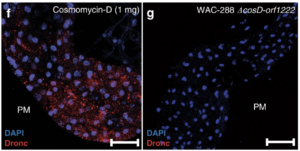
Microblog
Using Antioxidants to Treat Bacterial-Induced Colorectal Cancer
 Inflammatory bowel disorder (IBD) is a condition hallmarked by chronic inflammation of the lower digestive tract, afflicting over a quarter million Canadians (Government of Canada, 2019). Adding insult to injury, chronic inflammation from IBD is also one of the major risk factors for colorectal cancer (CRC) after hereditary syndromes such as Lynch syndrome (Venkataraman et al., 2005). Colorectal inflammation caused by gut-associated pathogenic bacteria, such as Helicobacter hepaticus, Escherichia coli, and Bacteroides fragilis, has been identified as a cause of tumorigenesis in both humans and mice (Dejea et al., 2018; Wang et al., 2017). One mechanism by which these pathogenic microbes induce colon inflammation (colitis) is through the production of highly reactive oxygen and nitrogen species. These reactive species produced via enzymes such as inducible nitric oxide synthase (iNOS) and NADPH oxidase can then result in DNA damage, leading to the development of cancer (Mittal, Siddiqui, Tran, Reddy, & Malik, 2014). Given this, Irrazabal et al. hypothesized that reducing these reactive species may prevent the onset of cancer in inflamed colons (Irrazabal et al., 2020). This work examines the fascinating intersection between the microbiota, genetics, and chronic inflammation to understand the cause of IBD-associated CRC.
Inflammatory bowel disorder (IBD) is a condition hallmarked by chronic inflammation of the lower digestive tract, afflicting over a quarter million Canadians (Government of Canada, 2019). Adding insult to injury, chronic inflammation from IBD is also one of the major risk factors for colorectal cancer (CRC) after hereditary syndromes such as Lynch syndrome (Venkataraman et al., 2005). Colorectal inflammation caused by gut-associated pathogenic bacteria, such as Helicobacter hepaticus, Escherichia coli, and Bacteroides fragilis, has been identified as a cause of tumorigenesis in both humans and mice (Dejea et al., 2018; Wang et al., 2017). One mechanism by which these pathogenic microbes induce colon inflammation (colitis) is through the production of highly reactive oxygen and nitrogen species. These reactive species produced via enzymes such as inducible nitric oxide synthase (iNOS) and NADPH oxidase can then result in DNA damage, leading to the development of cancer (Mittal, Siddiqui, Tran, Reddy, & Malik, 2014). Given this, Irrazabal et al. hypothesized that reducing these reactive species may prevent the onset of cancer in inflamed colons (Irrazabal et al., 2020). This work examines the fascinating intersection between the microbiota, genetics, and chronic inflammation to understand the cause of IBD-associated CRC.
The authors began by investigating the role of pathogenic bacteria in an IL10-/- murine model of colitis-induced colon cancer. They found that infection with various Helicobacter species E. coli NC101 infection, or dextran sodium sulfate (DSS) treatment, but not Citrobacter rodentium infection instigated inflammation and tumorigenesis. Furthermore, development of colitis led to dysbiosis of the mouse fecal microbiota (Irrazabal et al., 2020). These findings implicate a pathogen-specific causation of inflammation and subsequent formation of colon tumours in a genetically susceptible mouse background. Moving forward, the authors tested the hypothesis that these Helicobacter species were contributing to CRC via the production of reactive oxygen and nitrogen species which resulted in genetic damage. They found that treatment of mice with the antioxidant N-Acetyl Cysteine (NAC) or an iNOS enzyme inhibitor, L-NIL, had no effect on inflammation, but reduced tumorigenesis in the colon (Irrazabal et al., 2020). The authors investigated the levels of DNA damage by quantifying the number of 8-oxoguanine lesions, a common mutation due to oxidative damage. In mice treated with NAC and L-NIL, the levels of 8-oxoguanine lesions were significantly reduced, further supporting their model. Importantly, the authors also found that antioxidants reduced 8-oxoguanine lesions and colon tumours in their chemically-induced inflammation model, suggesting that oxidative DNA damage is a major mechanism of inflammation-associated CRC (Irrazabal et al., 2020).
A common genetic cause for CRC lies in impaired functionality of the DNA mismatch repair (MMR) pathway, which is defective in Lynch Syndrome. In previous work, resident microbes were found to enhance CRC progression in a mouse model of Lynch syndrome (Belcheva et al., 2014). Therefore, Irrazabel et al. investigated whether oxidative DNA damage was also the causative agent of CRC in this genetic syndrome. They discovered that colon epithelial cells with defects in MMR have higher levels of reactive oxygen species than normal cells and that this increase is exacerbated upon treatment with butyrate, a metabolite produced by intestinal bacteria. Furthermore, these reactive species were found to be specifically due to the oxidative metabolism of butyrate, which resulted in 8-oxoguanine lesions that could no longer be repaired in these MMR-deficient colon cells. While antioxidant treatment reduced 8-oxoguanine DNA lesions in the MMR-deficient backgrounds, it did not lead to a reduction in subsequent tumorigenesis (Irrazabal et al., 2020).
This work reveals that oxidative damage is a major mediator of CRC when chronic inflammation, but not genetic defects in DNA repair, is the underlying causative factor. This chronic inflammation and associated production of reactive oxygen species is directly linked to catabolism of metabolites produced by pathobionts, emphasizing the importance of a healthy microbiota. Overall, this work has advanced the mechanistic understanding of colitis-associated CRC and uncovered antioxidants as a potential treatment for this incredibly complex and dynamic disease.
Primary Research Article:
Irrazabal, T., Thakur, B. K., Kang, M., Malaise, Y., Streutker, C., Wong, E. O. Y., … Martin, A. (2020). Limiting oxidative DNA damage reduces microbe-induced colitis-associated colorectal cancer. Nature Communications, 11(1). https://doi.org/10.1038/s41467-020-15549-6
Other References:
Belcheva, A., Irrazabal, T., Robertson, S. J., Streutker, C., Maughan, H., Rubino, S., … Martin, A. (2014). Gut microbial metabolism drives transformation of msh2-deficient colon epithelial cells. Cell, 158(2), 288–299. https://doi.org/10.1016/j.cell.2014.04.051
Dejea, C. M., Fathi, P., Craig, J. M., Boleij, A., Taddese, R., Geis, A. L., … Sears, C. L. (2018). Patients with familial adenomatous polyposis harbor colonic biofilms containing tumorigenic bacteria. Science, 359(6375), 592–597. https://doi.org/10.1126/science.aah3648
Government of Canada. (2019). Inflammatory bowel disease (IBD). Retrieved from https://www.canada.ca/en/public-health/services/chronic-diseases/inflammatory-bowel-disease.html
Mittal, M., Siddiqui, M. R., Tran, K., Reddy, S. P., & Malik, A. B. (2014). Reactive oxygen species in inflammation and tissue injury. Antioxidants and Redox Signaling, 20(7), 1126–1167. https://doi.org/10.1089/ars.2012.5149
Venkataraman, S., Mohan, V., Ramakrishna, B. S., Peter, S., Chacko, A., Chandy, G., … Rolston, D. D. K. (2005). Risk of colorectal cancer in ulcerative colitis in India. Journal of Gastroenterology and Hepatology (Australia), 20(5), 705–709. https://doi.org/10.1111/j.1440-1746.2005.03810.x
Wang, C., Gong, G., Sheh, A., Muthupalani, S., Bryant, E. M., Puglisi, D. A., … Horwitz, B. H. (2017). Interleukin-22 drives nitric oxide-dependent DNA damage and dysplasia in a murine model of colitis-associated cancer. Mucosal Immunology, 10(6), 1504–1517. https://doi.org/10.1038/mi.2017.9




